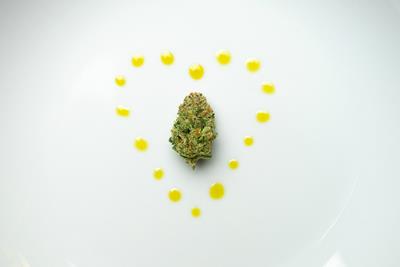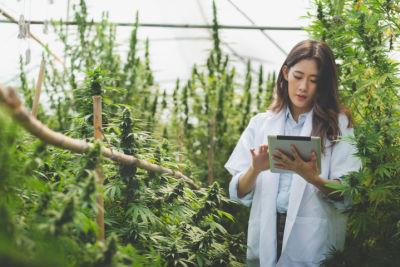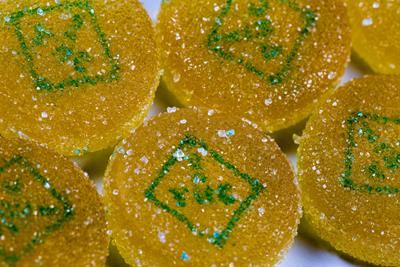
Sunday April 28, 2019
By Andrew Ward
 Education
Education
By now, it’s likely that most of the people reading this article will have some understanding of CBD. The cannabinoid has rapidly ascended in popularity in recent years as a treatment for a variety of conditions – especially thanks to the passing of the 2018 Farm Bill. Both medical and recreational consumers find relief in CBD and its ability to provide the effects of the plant without the psychoactive high from THC.
As technology expands and enhances, a growing number of CBD products and consumption methods have hit the market. Though each represents a CBD product, the varying products can and often do provide rather different experiences for consumers. While all potentially healthy and helpful, there are differences consumers should know before making their purchases. As the next phase in market awareness sets on the buying public, let’s learn a little bit more about full spectrum CBD and some of the other popular CBD methods on the market.
What is Full Spectrum CBD?
Full spectrum CBD oil is what most consumers purchase today. The oil, sometimes referred to as whole plant oil or extract, contains the complete range of cannabinoids found in the plant. Instead of isolating any specific compounds in cannabis or hemp, full spectrum CBD's final product keeps the plant's properties intact. That means that when consumed, a user receives the effects of cannabidiol as well as numerous other beneficial compounds. They include other cannabinoids, terpenes, minerals and even trace amounts of THC.

Proponents of full spectrum CBD do so primarily because of the entourage effect. By keeping the whole plant properties intact, consumers experience the synergistic relationship between the elements. It is largely believed that this effect aids in enhancing the effects of the oil. Thus, providing a more robust experience and healing potential for the user. While this theory has gathered momentum and does have some lab credibility, further critique and analysis are required before authenticating its validity. Regardless of the credibility of the entourage effect, whole plant CBD oil is a product that is changing lives from children with epilepsy to a person overwhelmed by daily stresses.
Other CBD Products on the Market
In addition to full spectrum CBD oil, consumers can opt for other consumption methods in the growing CBD market as well. Those seeking a purer alternative to full spectrum CBD now find themselves with options akin to other concentrates like rosin and THCA crystalline. Now, both solvent-based and solventless extraction options exist for those to choose from.
CBD Isolate
Consumers seeking just CBD reach for isolate, which contains 99% CBD. This is a popular option for consumers seeking pure CBD that is free of THC or any other potential compounds. As it is CBD in its most concentrated form, isolate comes in crystal powder rather than the oil most users may be used to consuming. People choose isolates for their versatility as an addition to foods and drinks, as well as through vaping.

Isolate can be made several different ways but one of the most popular methods is a refining process that uses hemp oil. A process involving sand and pressure called chromatography isolates the CBD from extracts over several rounds of refinement. In other cases, it can be extracted using CO2, ice water, butane and other solvents. Extractors utilizing this process then cool and execute various “finishing techniques” on their extracts to remove any remaining impurities.
CBD Distillate
As we detailed last year, distillate became one of 2017's biggest trend in concentrates. With 99% activated CBD, distillates employ short path distillation to refine the product down to a nearly clear end extract. Its ability to produce such high purities make it regarded as a top-shelf concentrate that is free of any other compounds. While distillate is usually labeled as “solvent-free,” it’s important to note that it is not “solventless.” Distillates all begin as hydrocarbon extracts, however, the distillation process removes all residual solvents out of the end products, making them “solvent-free.” “Solventless” products involve no chemicals or solvents throughout the entire process (think bubble hash or rosin).
Is Full Spectrum CBD Right for You?
Those that choose full spectrum CBD often enjoy its robust end product that goes just beyond a single cannabinoid. By employing the entourage effect, consumers are likely to experience the full impact of the product and potentially better results. The inclusion of terpenes, additional cannabinoids and other elements of the plant provide more than what CBD alone can offer. On the other hand, those that opt for isolates and distillates seek out a purer experience, where CBD alone is the focus of the treatment. In the end, the choice comes down to the consumer. As long as the CBD does the job, that’s all that matters in the end.
Have you tried full spectrum CBD yet? If so, what was your experience like? Let us know in the comments below!
Photo Credit: Sherpa SEO (license)







